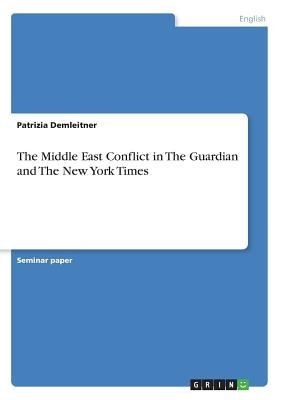
- We will send in 10–14 business days.
- Author: Patrizia Demleitner
- Publisher: GRIN Verlag
- Year: 2007
- Pages: 34
- ISBN-10: 3638666069
- ISBN-13: 9783638666060
- Format: 14.8 x 21 x 0.2 cm, softcover
- Language: English
- SAVE -10% with code: EXTRA
The Middle East Conflict in The Guardian and The New York Times (e-book) (used book) | bookbook.eu
Reviews
Description
Seminar paper from the year 2002 in the subject English Language and Literature Studies - Linguistics, grade: 1.7, University of Regensburg (Institut für Anglistik und Amerikanistik), course: Hauptseminar The Language of News Reporting, language: English, abstract: Mark Twain once said, "If you don't read the newspaper, you are uninformed; if you do read the newspaper, you are misinformed". Indeed, it's true that most newspapers tend to be biased and to represent a certain ideology. Nearly imperceptible, the newsmaker leaves marks or hints of his attitude and ideology in his work and thus very often looses the independence and objectivity that news reporting ought to have. Evidence can be found for example in the choice of vocabulary, the sentence structure or the narrative structure of an article. This analysis wants to examine and compare two leading newspapers, the Guardian and the New York Times, with regard to bias in the way they are treating the Middle-East conflict. For a long time, the violence in the Middle East and the conflict between Israelis and Palestinians have been a common topic in the news and therefore it is important to know how far the reader can rely on an objective point of view when events are reported. Not a day goes by without a headline dealing with peacemaking efforts or a new attack of a suicide bomber or another advance of the Israeli army on Palestinian ground. I want to verify the hypotheses that the Guardian takes a rather anti-Israeli position about which even its own reporters state that it is "so anti-Israeli it (is) embarrassing", whereas the New York Times will probably be in favour of Ariel Sharon and Israel. After a short overview of the two newspapers, the topic will be introduced briefly. This will be followed by a linguistic analysis of a selection of articles which will focus on features with regard to the linguistic approach of critical linguistics and social semiotics of Roger Fowler (Fowler 1991). In the centre of a
EXTRA 10 % discount with code: EXTRA
The promotion ends in 18d.13:42:28
The discount code is valid when purchasing from 10 €. Discounts do not stack.
- Author: Patrizia Demleitner
- Publisher: GRIN Verlag
- Year: 2007
- Pages: 34
- ISBN-10: 3638666069
- ISBN-13: 9783638666060
- Format: 14.8 x 21 x 0.2 cm, softcover
- Language: English English
Seminar paper from the year 2002 in the subject English Language and Literature Studies - Linguistics, grade: 1.7, University of Regensburg (Institut für Anglistik und Amerikanistik), course: Hauptseminar The Language of News Reporting, language: English, abstract: Mark Twain once said, "If you don't read the newspaper, you are uninformed; if you do read the newspaper, you are misinformed". Indeed, it's true that most newspapers tend to be biased and to represent a certain ideology. Nearly imperceptible, the newsmaker leaves marks or hints of his attitude and ideology in his work and thus very often looses the independence and objectivity that news reporting ought to have. Evidence can be found for example in the choice of vocabulary, the sentence structure or the narrative structure of an article. This analysis wants to examine and compare two leading newspapers, the Guardian and the New York Times, with regard to bias in the way they are treating the Middle-East conflict. For a long time, the violence in the Middle East and the conflict between Israelis and Palestinians have been a common topic in the news and therefore it is important to know how far the reader can rely on an objective point of view when events are reported. Not a day goes by without a headline dealing with peacemaking efforts or a new attack of a suicide bomber or another advance of the Israeli army on Palestinian ground. I want to verify the hypotheses that the Guardian takes a rather anti-Israeli position about which even its own reporters state that it is "so anti-Israeli it (is) embarrassing", whereas the New York Times will probably be in favour of Ariel Sharon and Israel. After a short overview of the two newspapers, the topic will be introduced briefly. This will be followed by a linguistic analysis of a selection of articles which will focus on features with regard to the linguistic approach of critical linguistics and social semiotics of Roger Fowler (Fowler 1991). In the centre of a


Reviews